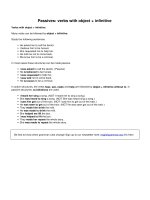UEfAP passives
Bạn đang xem bản rút gọn của tài liệu. Xem và tải ngay bản đầy đủ của tài liệu tại đây (99.61 KB, 2 trang )
UEfAP Passives
Grammar in EAP
Passive verbs
Introduction
In spoken English we often use a subject such as "people", "somebody", "they", "we", or "you" even
when we do not know who the agent is. In formal English, particularly writing, we often prefer to use a
passive.
Compare:
They're installing the new computer system next month.
The new computer system is being installed next month. (more formal)
Examples
D. J. Wrench is one of the few to have considered in any detail what happened after the National
Government was formed.
The first National Government was not intended to be a coalition government in the normal sense of
the term.
Proteins acting in this way are called `enzymes"; their method of working is described on p. 61. Of
course, these enzymes are also coded for by a DNA gene in the nucleus.
Much attention has been focused on the concept of "reasonable excuse", where the courts have
attempted to impose a fairly stringent test on persons whose reason for carrying a weapon is said to
be fear of attack.
Some verbs are commonly used in the passive in academic texts (Hinkel, 2004, p. 166).
The most common passive verbs in academic writing are:
made, seen, found, considered, given, used, done, shown
Other vebs mainly used in the passive are:
achieved, aligned (with), applied, approved, asked, associated (with), attributed (to), based (on),
born, brought, calculated, called, carried (as), chosen, classified, compared, composed (of),
coupled (with), deemed, defined, derived, described, designed, determined, discussed, distributed,
documented, drawn, entitled (to), estimated, examined, expected, explained, expressed, extracted,
/>
1/2
flattened, formed, given, grouped (with/by), held, identified, illustrated, inclined, intended,
introduced, involved, kept, known, labelled, left, limited (to), linked (to/with), located (at/in), lost,
measured, needed, noted, observed, obtained, performed, plotted, positioned, prepared,
presented, recognised, regarded, related (to), replaced, reported, represented, required, said,
situated, subjected (to), transferred, viewed.
Some verbs are almost never used in the passive (Hinkel, 2004, p. 163):
appear, arrive, belong. consist, come, die, happen, fall, lack, last, occur, remain, resemble, rest,
seem, stay, wait.
/>
2/2









